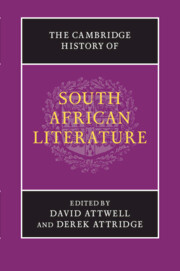Book contents
- Frontmatter
- Introduction
- PART I ORATURES, ORAL HISTORIES, ORIGINS
- PART II EXPLORATION, EARLY MODERNITY AND ENLIGHTENMENT AT THE CAPE, 1488–1820
- PART III EMPIRE, RESISTANCE AND NATIONAL BEGINNINGS, 1820–1910
- PART IV MODERNISM AND TRANSNATIONAL CULTURE, 1910–1948
- PART V APARTHEID AND ITS AFTERMATH, 1948 TO THE PRESENT
- PART VI SOUTH AFRICAN LITERATURE: CONTINUITIES AND CONTRASTS
- Index
- References
Introduction
Published online by Cambridge University Press: 28 January 2012
- Frontmatter
- Introduction
- PART I ORATURES, ORAL HISTORIES, ORIGINS
- PART II EXPLORATION, EARLY MODERNITY AND ENLIGHTENMENT AT THE CAPE, 1488–1820
- PART III EMPIRE, RESISTANCE AND NATIONAL BEGINNINGS, 1820–1910
- PART IV MODERNISM AND TRANSNATIONAL CULTURE, 1910–1948
- PART V APARTHEID AND ITS AFTERMATH, 1948 TO THE PRESENT
- PART VI SOUTH AFRICAN LITERATURE: CONTINUITIES AND CONTRASTS
- Index
- References
Summary
The names of a small number of South African writers are familiar around the globe: they include Olive Schreiner, Alan Paton, Athol Fugard, Nadine Gordimer, André Brink, Wilbur Smith and J. M. Coetzee. Others, such as Zakes Mda, Damon Galgut, Njabulo Ndebele, Antjie Krog, Marlene van Niekerk, Ivan Vladislavić and Zoë Wicomb, have growing international reputations. Earlier periods recorded fame for writers whose stars have now faded, among them Sarah Gertrude Millin, Daphne Rooke and Laurens van der Post. Many South Africans have gone on to make names for themselves in other countries: among authors well known in the United Kingdom, for instance, are Dan Jacobson, Barbara Trapido, James McClure, Christopher Hope, Justin Cartwright and Tom Sharpe.
A roll-call of this sort, however, gives very little sense of the range and richness of South Africa's literary output. Several literary traditions, oral and written, have fed into the complex array of verbal productions charted in this volume, at times influencing or infiltrating one another, and at other times ignoring or challenging one another. From indigenous folk-tales to European elite art, these traditions have been constantly reworked and reinvented, creating an extensive body of literary art that continues to grow, despite the smallness of the home market and the very limited financial means of most potential readers. South Africa's fraught political history, with its continual inroads into the lives of ordinary people, has given rise to remarkable literary achievements while at the same time skewing the institutional processes whereby works of literature are produced and disseminated.
- Type
- Chapter
- Information
- The Cambridge History of South African Literature , pp. 1 - 14Publisher: Cambridge University PressPrint publication year: 2012
References
- 2
- Cited by

